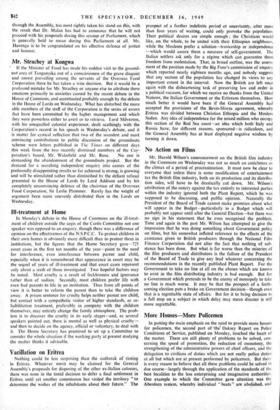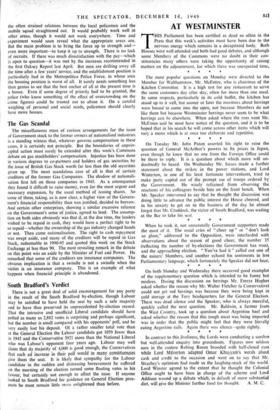More Houses—More Policemen
In putting the main emphasis on the need to provide more houses for policemen, the second part of 'the Oaksey Report on Police Conditions of Service, published on Monday, touched the heart of the matter. There are still plenty of problems to be solved, con- cerning the speed of promotion, the reduction of monotony, the strengthening of the administrative powers of chief officers, and the delegation to civilians of duties which are not really police duties at all but which are at present performed by policemen. But there is every reason to believe that all these problems could be solved in due course—largely through the application of the standards of the best localities to the less enterprising and imaginative authorities. One example to which the Committee gave attention was the Aberdeen system, whereby individual " beats" are abolished, and the often strained relations between the local policemen and the mobile squad straightened out. It would probably work well in other areas, though it would not work everywhere. Time and experiment would soon reveal what the appropriate areas are. But the main problem is to bring the force up to strength and— even more important—to keep it up to strength. There is no lack of recruits. If there was much dissatisfaction with the pay—which is open to question—it was met by the increases recommended in the first Oaksey Report last April. But men are drifting away all the time after a few years' service, and the establishment position is particularly- bad in the Metropolitan Police Force, in whose area the housing position is worst of all. It surely needs something less than genius to see that the best anchor of all at the present time is a house. Even if some degree of priority had to be granted, the police (who know something of the effect of overcrowding on the crime figures) could be trusted not to abuse it. On a careful weighing of personal and social needs, policemen should clearly have more houses.



































 Previous page
Previous page